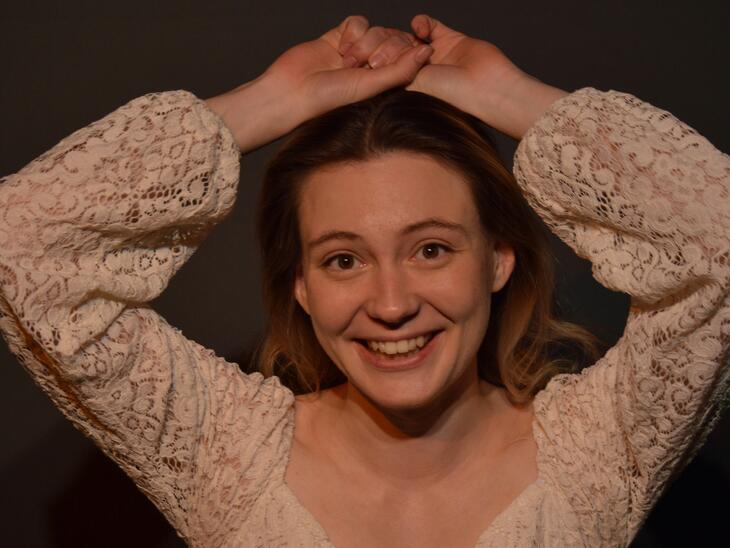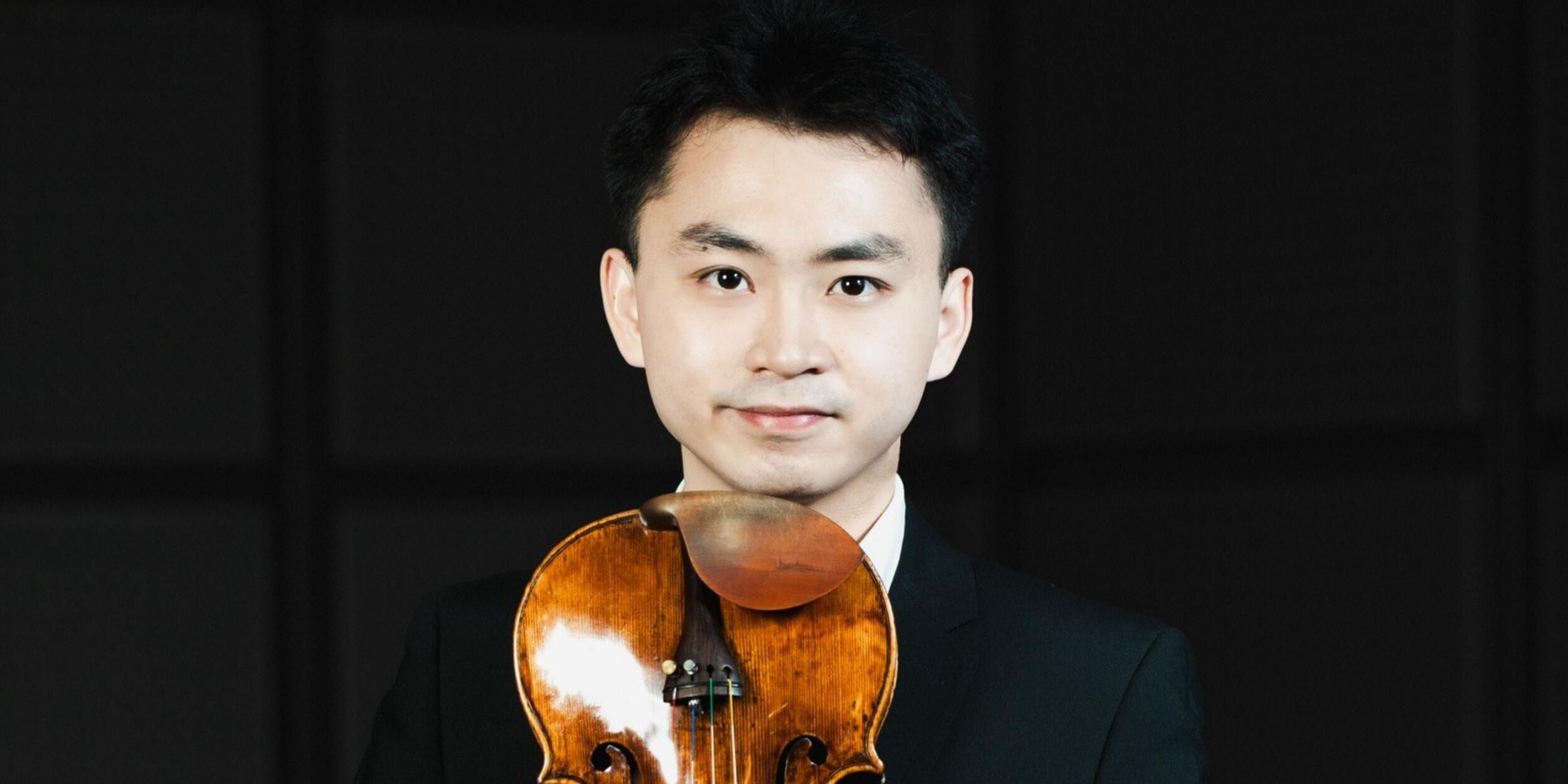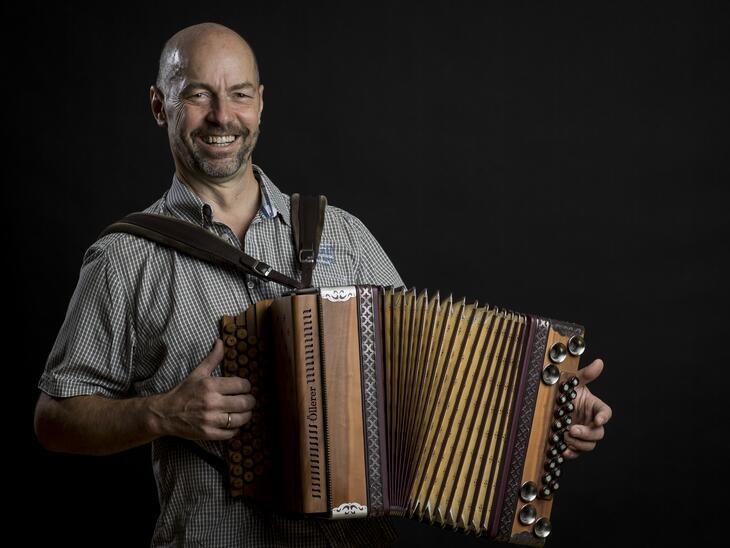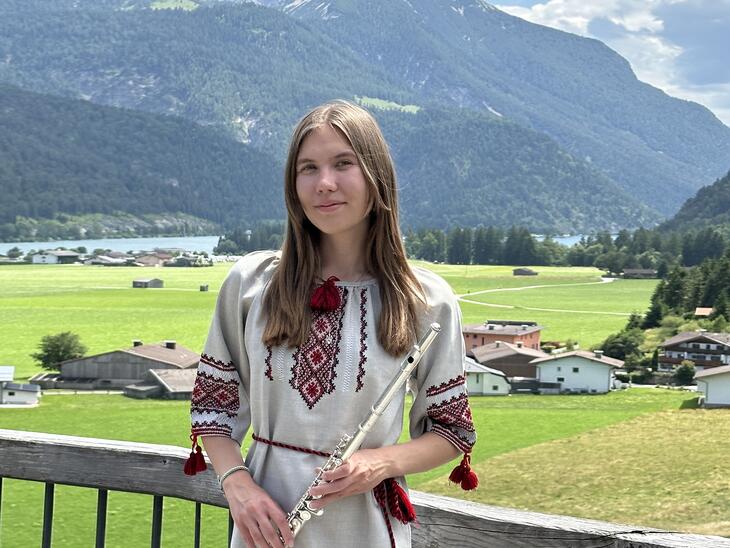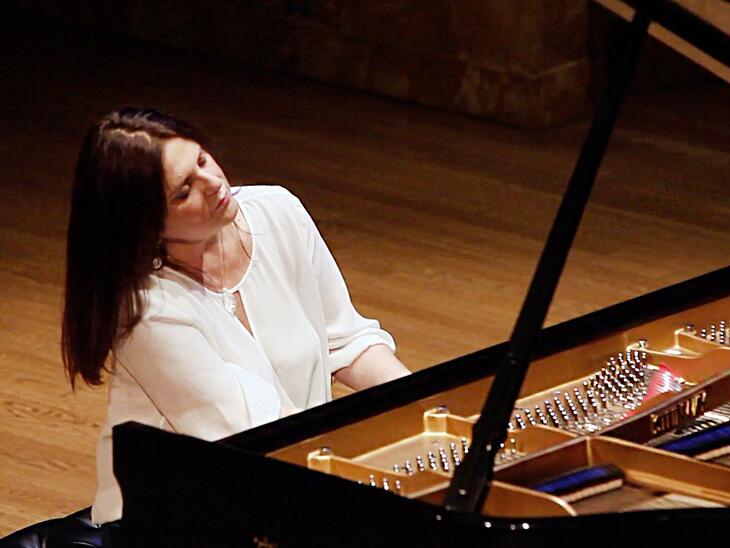Ziyu He began learning the violin at the age of five in his native China with Xiangrong Zhang. At just 10 years old, he was invited by Paul Roczek to study in Salzburg at the Mozarteum University, where he completed a master's degree in violin with Paul Roczek in summer 2021 and a master's degree in viola with Thomas Riebl in January 2024, as well as a postgraduate degree in violin with Benjamin Schmid. He plays a violin by Antonio Stradivari from 1698, which was made available to him by the Austrian National Bank, and a Giuseppe Guadagnini viola, dated 1797.
An interview with Associate Professorof Music Education Dr. Michaela Schwarzbauer on February 5, 2024:
You started your violin training in China, but you came to Austria very early on. I think it's a huge step to come to a completely different culture at that age?
I was eleven years old when I arrived. It wasn't that difficult for me because I was young and very open. As a person, I am still very open to many things now, but actually - to take such a big step now, to move to a completely different country, to live in Asia or America, that would be almost impossible for me at my current age. It was a big decision for my parents - a somewhat desperate decision, because they didn't know whether they would succeed. But thank God they did, and my parents are still very happy together. It wasn't a problem for me at the time, as I had always wanted to come to Europe as a child and see the world. It wasn't a culture shock, but it was very different for me. I was very curious about everything that was going on here, both the music and the people. I was very interested in everything and I also went to school in Salzburg.
It was obviously a smooth transition for you. I think your mother accompanied you to Austria. Was it that easy for her too?
I don't think so. I think it was a very courageous step for my parents to allow my mother to come to Salzburg alone with me and live here with me for six years. I am very grateful to my parents for that.
It's a big leap - also linguistically. How did you experience it? Had you learned German before?
I had learned the language a bit beforehand, but I could only do simple things like greetings. That's why I first took this "A 1" or "A 2" course at the Mozarteum. This was followed by an intensive course and I had to complete "B 1" within a month. I actually spent six to seven hours a day learning the language. After that, my written language was reasonably okay. But then I went to school and my pronunciation was completely different to what I had learned on the course or was tested on. I still remember the math teacher. She was very, very strict and always spoke in Salzburg dialect, so I hardly understood anything at first. But at the age of eleven, you learn everything quite quickly. It took me a few months to be able to talk to others without any problems - even in the Salzburg dialect.
That means you went straight to school here. I assume you went to music school?
No, unfortunately not. I went to St. Andrä School. That was mainly a decision made by my teacher Paul Roczek, as I was allowed to be absent whenever necessary. That was a luxury at that school. The absence rule at the Musisches Gymnasium is very strict and you are not even allowed to go to a competition and be absent for a week or ten days. That's exactly why I went to this school. Of course, the standard wasn't that high. In the afternoons I was always at the Mozarteum for lectures or lessons.
How do you get on with young people at school when you seem like a stranger and don't yet have a hundred percent command of the language?
I didn't notice that at first, as I think my classmates were very curious about someone who came from faraway Asia. There were also other international students at the school. There was more of a dispute because I was given a special status, namely that I was always allowed to travel and still got quite good grades. That was a difficult time at school. But I think it was important that I went to school at a young age and had contact with young people of the same age. That's very, very important for your development - whether that was good or bad is irrelevant, it's part of it.
I assume things were different at the Mozarteum: lots of older students, at least at the time they were a lot older than you.
This is my home! I felt at home then and I still do now.
I remember that you were often seen at the Mozarteum. Your teacher Paul Roczek was certainly a very important anchor?
Exactly, he was and is my mentor and discovered me, so to speak, and shaped my development.
And he gave you a lot of time and obviously also clarified everyday questions for you, such as choosing a school.
Yes, he was always there and he shaped me not only musically, but also as a person, in my personality, which is something you don't often find with teachers these days. When I first came to Austria, we went out to eat once a week. He introduced me and my mother to traditional Austrian food and we also went hiking. So he didn't just teach me a lot about playing the violin and music, but also other important things that are part of life: How to live and get along with other people. That will stay with me for the rest of my life.
I think that's also important, because it's the only way to really develop an ambition for the violin. You were curious, there weren't as many problems for you as there obviously were for your mother. What were the biggest challenges for you at the beginning?
It was wonderful for me here, because I actually came for the music. And the music has really inspired me a lot. You have to imagine that I come from the Chinese coastal city of Qingdao. It was originally a German city and I come from the former German part. But of course nobody speaks German there anymore, although the buildings are still reminiscent of the German colonial era. Perhaps there is something magical about the fact that I have just come to Austria, to a German-speaking country. But the atmosphere is simply different in Salzburg. You can smell a hint of music everywhere here. And back then there was a lot more music on the street. It was a different world for me. And I can still remember my first impressions. My mother took me to church every Sunday and I was allowed to listen to the organ. I didn't know that at all from China. We also went to the opera a lot and I attended at least one class recital of various instruments every day. So in one year I got to know all the classes and also many students. I always wrote down in the program booklet what was special, what was good and what was bad. And that also developed me as a person and musician.
Here you developed your powers of judgment, so to speak, by going to the class evenings as a little music critic yourself. Does that also mean that finding contacts with other students - including older students - wasn't difficult for you at all?
It wasn't difficult and, as I said, I was one of the few younger students at the university and I was allowed to go to lectures earlier. I was allowed to start music composition and ear training at 14 or 15. I was able to take the "normal things" and these were also recognized. I got to know a lot of professors and older students and stayed in close contact with them.
You talk about "being allowed" here. You're talking about being allowed to go to a composition course or a music history lecture. For many students, attending theory courses alongside their instrumental studies is more of a must.
No, I think it's very important, it's all part of my job, even if I don't have to write a choral movement later on. The skills last a lifetime and that's why I say that you can. I'm grateful that I was able to learn at a very young age what others can only learn later.
And your teacher always encouraged you in this direction, even if there were lessons that you could have spent on the violin?
Yes, he was always in favor of me trying out many other things, including improvisation. He was very, very open and very forward-thinking. Although I didn't understand a lot of things back then, I did them anyway. I thought that when he said something, he knew what it was good for. And today I look back and can say: it was all very important, they were the right decisions.
And then you grow up at some point, don't you? As a violinist, you suddenly find yourself in this situation: now I'm no longer just a child, I'm on the cusp of becoming a professional, a self-determined artist. Was that a difficult time or did it all happen seamlessly?
It was very gentle at first, but later on, when you're in this profession, there are quite big waves. I think of the time after winning the Menuhin Competition. Back then, I got a few invitations to give professional concerts. I was convinced that this would be my profession. Of course, I continued to study a lot back then, I hadn't finished my bachelor's degree yet. In 2017, after my debut with the Vienna Philharmonic Orchestra, my concert career really took off. I didn't have the impression that it was any different. Everything was more or less prepared, it wasn't a leap, it was all a natural progression.
But you also said that the waves came later. What are these waves?
In 2018, I signed a contract with an agency for the first time and expected nothing more than that big concerts would follow a week later, which is of course nonsense - but that's how I imagined it. In fact, no concerts materialized for 34 weeks and that's when I got pretty depressed. I actually thought about whether a career as a musician made sense. Should I continue working as a violinist or should I do something else? I have a musical friend who is a very good violinist and conductor. But he is also the owner of a Michelin restaurant. He cooks wonderfully and I saw him as a role model back then because I'm very interested in cooking - even today. At the time, I thought: well, maybe I should stop playing the violin and become a chef and maybe, with a bit of luck, open a Michelin-starred restaurant later on. I didn't share this idea with many people, but I did share it with Paul Roczek and my parents. My parents were very open and would have continued to support me. But Paul Roczek said a very important sentence that had a big impact on me: "The cooking world won't miss you, but the violin world will certainly miss you a lot." That got me thinking and, thank God, a few concerts came along, so I thought to myself: Okay I'll try this out again. If it goes well, I'll stick with it. And I've stuck with it to this day.
I think that's great. I have no doubt that you would also make an excellent chef and I would love to eat at your place, but I am still very grateful for your decision and underline what Paul Roczek said: It takes the violinist and violist.
Yes, I think that was the right decision. Things always happen that make you rack your brains and worry a lot. Unfortunately, that's always part of our profession, because you're not permanently employed, there's no security and you always have to fight and be lucky.
Do you suddenly see other violinists and violists as competition?
There is a lot of competition, especially later on when you enter the profession, because unfortunately the world doesn't need so many soloists. You don't just have to fight, you also need luck and a lot of patience. But it doesn't help much if you ask yourself: Why did he or she manage these concerts and I didn't? Am I just as good, am I better or worse? I can only really make comparisons with myself, that really helps me.
That means you can also go to other people's concerts and be happy and say: That's great and this interpretation is exciting?
I really enjoy going to concerts. What really inspired me were concerts at the Salzburg Festival last year: I'm thinking of Tabea Zimmermann, Jean-Guihen Queyras and Isabelle Faust. They all played a solo piece and then chamber music a few hours later. It was a great moment for me and I will never forget it. The three great artists - and I see them as real artists - how exemplary they performed! Of course, I don't like all the concerts I go to, but you can always get inspiration.
In other words, if you were invited by Ms. Faust to perform with her in a chamber music evening, would that be a great moment for you?
It would be a dream come true for me. I think she is a unique artist and I love her interpretations.
Do you also have the feeling on stage that today was a great moment?
That could happen, but unfortunately not very often for me. Of course, you're always very critical of yourself. But of course there are some very good concerts that you really appreciate in retrospect, especially if the recording also sounds good. In this context, I remember one of the best concerts I played here, but unfortunately these are only isolated, rare cases. A concerto is never one hundred percent. Small mistakes always happen, even with great artists, and that bothers us artists a lot - although the audience is probably more forgiving.
You're still very young, so I'm sure you have a lot of great experiences ahead of you. We've already talked a bit about competitions. You've taken part in quite a few competitions and won some: I'm thinking of the Mozart Competition and the Menuhin Competition. Are competitions important and is it perhaps also important not to win?
There are two different opinions here: Some say competition is important because it could open the door to a career, so to speak. Others are of the opinion that a competition is unimportant because there are too many competitions nowadays, which is why most winners don't play a decisive role on stage later on. I agree, but in my opinion, competition is still absolutely right and important. At the end of the day, it's not just about winning. Of course it's nice if you win a prize, but it's also important if you don't win sometimes or more often. That's the only way you can develop further and you see other people, top artists from all over the world, because the very good artists who come together don't all come from one place. For example, if someone is the best in Salzburg, they will meet many musicians from other areas and then probably no longer be the best - although you can't really say the best either. Who is the best?
You can't compare music, but I actually think it's good that a competition opens people's eyes a little and makes it clear: "Ah, you can play that differently too." There is not just one way of interpreting, but many ways, and what the jury likes and doesn't like and how the jury behaves can be different. It's all a matter of experience. I can remember my first competitions: apart from a German Simon Goldberg competition, I didn't win any competitions for quite a long time - if at all, then only second and third places. As a young thirteen or fourteen-year-old, I wasn't very successful in this scene, but that made me stronger. I learned how to prepare a program and how to create my own interpretation. I think that's very important and of course I owe it to the Menuhin Competition that a door to a solo career opened. The competition was the real start of my career. So, from my point of view, a competition can be important and very good for the start of a career.
You handled second and third places really well, your teacher and your parents probably did too?
Yes, I don't think that was a problem for everyone else, but it was tough for me. There are always disputes within individual juries. I'm thinking of Isabelle Faust, she didn't win competitions in the past, even though she played so well. Of course it was hard for me not to win - but it was also important. I think if a set-up goes too well, it's quite easy to fall.
I would like to take up another topic: You have now completed two Bachelor's and two Master's degrees at the Mozarteum University. Some people may have asked: why go to all this trouble?
It was very important for me to do a master's degree in violin at the beginning, because nowadays you need at least a master's degree. The viola didn't stay with me for quite as long. I started playing the viola at the age of 13 or 14. It is always an inspiration for me to hear and play this instrument. In this sense, I really wanted to complete my studies, as a milestone for myself, so to speak - even if I don't perform as much on the viola as I do on the violin. There's nothing wrong with doing a diploma on the viola, for me it's also a nice memory.
Does that mean that a course of study is only "finished" for you when you have also obtained a diploma?
I am a person who likes to see things through to the end. Of course, there were times when I thought: Oh, this is tedious. Writing two more term papers or a final paper takes time and energy, of course; but - I also learned a lot from it. You get to know a piece much better when you write a paper about it. Language as a means of expression is also important.
I would like to ask a final question. What are your current impressions of the Mozarteum University and what do you wish for it in the coming years? What would you like the Mozarteum University Salzburg to look like in 20 years' time, when you are already a very famous violinist and come to Salzburg from time to time?
Yes, I have a very special connection to our university because I practically grew up in this building. It's really nice to see how many great musicians have come out of this building while I was studying here. Many concertmasters or international soloists and chamber music players have been formed here, and we have wonderful teachers. I would also like to thank former rectors, especially the former vice-rector Sarah Wedl Wilson, and the current rector Elisabeth Gutjahr, who have all been very supportive and have run the Mozarteum incredibly well. In my eyes, the Mozarteum is a calling card for Austria, at least for Salzburg.
I would like to see more opportunities created here in the coming years for young artists and students to perform on stage. It is very important to be able to work with professional orchestras. Of course, it's a question of money, but a musician without a stage won't develop, won't make any big steps. I would like students to find opportunities to perform, not just with orchestras, but also to play concerts somewhere. A wonderful example of "Live Music Now" is made possible by the Menuhin Foundation, which sometimes gives two thousand concerts a year worldwide. Playing in hospitals or prisons, being allowed to play for other audiences, presenting programs at a party, etc., is very important, because the concert experience is basically no different than performing in a large concert hall later on. I would very much like to see more opportunities for musicians to perform.
Would you like to come back here as a violin professor yourself one day?
That would be a dream for me, of course. To be able to continue sharing my music here, because this really is a special place for me. I appreciate and am very grateful that I did my diploma and my development on the violin and viola here, in this house.
And we are very grateful that we were able to accompany you a little.
